
JOURNAL OF INTELLIGENT INFORMATION SYSTEMS
Scope & Guideline
Advancing the Frontiers of Intelligent Systems
Introduction
Aims and Scopes
- Intelligent Systems and Algorithms:
The journal publishes research on algorithms that enable intelligent processing of data, including machine learning, deep learning, and reinforcement learning approaches. - Data Mining and Knowledge Discovery:
A core focus is on methodologies for extracting meaningful patterns and knowledge from large and complex datasets, enhancing the ability to make informed decisions. - Recommendation Systems:
The journal features studies on various types of recommendation systems, including collaborative filtering, content-based, and hybrid methods, addressing challenges like cold-start problems and user preference modeling. - Natural Language Processing (NLP) and Text Mining:
Research in this area includes sentiment analysis, question answering systems, and topic modeling, applying NLP techniques to enhance understanding and categorization of textual data. - Multimodal Data Processing:
The journal supports research that integrates multiple forms of data (text, images, audio) to improve analysis and decision-making processes in intelligent systems. - Human-Computer Interaction (HCI):
There is an emphasis on developing systems that enhance user experience and interaction, making intelligent systems more accessible and usable for end-users. - Process Mining and Business Process Management:
The journal includes studies on the analysis and optimization of business processes using data-driven approaches to improve efficiency and effectiveness. - Graph-Based Techniques:
Research involving graph theory and network analysis is prominent, particularly in applications like social network analysis and knowledge graph construction.
Trending and Emerging
- Federated Learning and Privacy-Preserving Techniques:
With growing concerns around data privacy, research on federated learning, which allows model training across decentralized data sources, is gaining traction. - Explainable AI (XAI):
There is a notable increase in studies aimed at making AI systems more interpretable and understandable for users, addressing the black-box nature of many models. - Real-Time Data Processing and Streaming Analytics:
As data generation accelerates, methodologies that support real-time analytics and decision-making are becoming more prevalent in the journal's publications. - Multimodal Learning:
Research that combines various data types (text, images, audio) to enhance learning and prediction capabilities is emerging as a key trend. - Social Media Analytics and Sentiment Analysis:
The analysis of social media data for understanding public sentiment and behavior is increasingly featured, reflecting the importance of social networks in contemporary research. - Health Informatics and Biomedical Applications:
The application of intelligent systems in health-related fields, particularly using machine learning for predictive analytics and decision support, is on the rise. - Robustness and Fairness in AI Systems:
With growing scrutiny on AI's societal impacts, research focusing on the fairness, accountability, and robustness of intelligent systems is becoming more prominent. - Knowledge Graphs and Semantic Technologies:
The use of knowledge graphs for enhancing information retrieval and recommendation systems is gaining attention, highlighting the importance of structured data.
Declining or Waning
- Traditional Statistical Methods:
As machine learning and advanced computational techniques gain prominence, traditional statistical approaches in data analysis are becoming less emphasized in recent publications. - Rule-Based Systems:
The shift towards data-driven and learning-based approaches has led to a decrease in the focus on rule-based expert systems, which were previously a significant area of research. - Simple Recommender Systems:
With the increasing complexity of user needs and data types, there is a noticeable decline in research focused on basic recommender systems that do not incorporate advanced algorithms or multimodal data. - Static Data Analysis Techniques:
Research centered on static datasets without considering dynamic and real-time data processing has been decreasing, reflecting a broader trend towards more responsive analytical methods. - Generic Approaches to AI:
There has been a shift away from generic AI approaches in favor of specialized and tailored solutions that address specific problems or domains.
Similar Journals

CAAI Transactions on Intelligence Technology
Empowering Innovation in AI and BeyondCAAI Transactions on Intelligence Technology is a premier peer-reviewed journal published by WILEY, dedicated to advancing the fields of Artificial Intelligence, Computer Networks and Communications, Computer Vision and Pattern Recognition, Human-Computer Interaction, and Information Systems. Since its inception in 2017, this Open Access journal has rapidly ascended the ranks, achieving Q1 quartile status across multiple categories as of 2023, and is recognized for its rigorous standards and innovative research dissemination, evidenced by impressive Scopus rankings, including Rank #12 in Computer Vision and Pattern Recognition. Through its commitment to providing a platform for high-quality research, the journal invites contributions from scholars globally, fostering a collaborative environment that stimulates intellectual exchange and encourages advancements in intelligent technology. Addressed to researchers, professionals, and students alike, CAAI Transactions on Intelligence Technology serves as a vital resource for those aiming to stay at the forefront of technological innovation.

Frontiers of Computer Science
Exploring the Nexus of Theory and Application in Computer ScienceFrontiers of Computer Science is a leading peer-reviewed journal dedicated to advancing the field of computer science through the publication of high-quality research articles, reviews, and theoretical discussions. Published by HIGHER EDUCATION PRESS, this journal has gained significant recognition, currently boasting a prestigious impact factor and ranking in the Q1 quartile for both Computer Science (miscellaneous) and Theoretical Computer Science categories in 2023. With a focus on the intersection of computational theory and practical applications, it serves as a vital platform for researchers, professionals, and students alike who are eager to contribute to and stay updated with groundbreaking developments. The journal’s scope encompasses a wide range of topics, reflecting the diverse nature of computer science today. Operating from Beijing, China, it emphasizes Open Access, ensuring that vital research is readily available to the global academic community. With its convergence period spanning from 2013 to 2024, Frontiers of Computer Science remains committed to fostering innovation and scholarly dialogue that drives the future of technology.
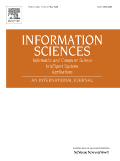
INFORMATION SCIENCES
Exploring Innovations in Data and SystemsINFORMATION SCIENCES, published by Elsevier Science Inc, is a premier peer-reviewed journal that has become instrumental in advancing the field of information science since its inception in 1968. With an impressive array of quartile rankings in 2023, including Q1 in Artificial Intelligence, Computer Science Applications, Control and Systems Engineering, Information Systems and Management, Software, and Theoretical Computer Science, this journal serves as a vital resource for researchers and professionals looking to explore cutting-edge theories and practical applications within these domains. The journal is indexed extensively, with notable Scopus rankings, reflecting its significance and influence in the academic community—ranked 6th in Theoretical Computer Science and 10th in Information Systems and Management, among others. Although it does not currently offer an open-access option, the depth of research published within INFORMATION SCIENCES ensures that it remains a key reference point for advancing academic inquiry and addressing complex challenges in the information landscape.
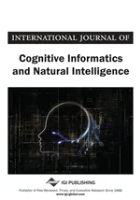
International Journal of Cognitive Informatics and Natural Intelligence
Transforming Understanding through Cognitive ResearchThe International Journal of Cognitive Informatics and Natural Intelligence, published by IGI Global, is an essential resource for researchers and professionals exploring the intersections of cognitive informatics, artificial intelligence, and human-computer interaction. Since its establishment in 2007, this journal has focused on advancing the understanding of cognitive systems and their applications in natural intelligence, contributing significantly to the fields of software engineering and interface design. Operating out of the United States, the journal aims to disseminate high-quality research and innovative methodologies to foster interdisciplinary collaboration. Despite its current standing in Q4 quartiles for the fields of Artificial Intelligence, Human-Computer Interaction, and Software, it serves as a vital platform for emerging scholars and seasoned professionals alike seeking to explore new frontiers in cognitive technologies. While it does not provide direct open access, these publications are instrumental in shaping academic discourse, and contribute to ongoing advancements in how we understand and integrate cognitive science into practical applications.
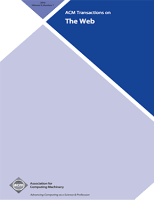
ACM Transactions on the Web
Exploring Cutting-Edge Applications in Web ScienceACM Transactions on the Web is a highly regarded journal published by the Association for Computing Machinery (ACM), focusing on the vast and evolving field of web technologies and their applications. With an impact factor that places it in the Q2 quartile of the Computer Networks and Communications category for 2023, this journal ranks #154 out of 395 in its discipline, showcasing its significance in advancing research and knowledge in the domain. Since its inception in 2007 and continuing through 2024, the journal has been dedicated to publishing original research that contributes to all aspects of web-based systems, applications, and services. ACM Transactions on the Web provides an essential platform for scientists, engineers, and practitioners engaged in web research, offering insights into cutting-edge methodologies and emerging technologies. Readers will appreciate the depth and diversity of articles, which encompass both theoretical and applied research, as well as reviews and case studies. The journal's commitment to quality and rigor makes it a valuable resource for anyone invested in the future of web technologies.
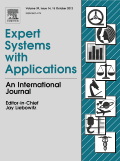
EXPERT SYSTEMS WITH APPLICATIONS
Exploring Innovations in Expert ApplicationsEXPERT SYSTEMS WITH APPLICATIONS is a premier journal published by PERGAMON-ELSEVIER SCIENCE LTD, dedicated to showcasing cutting-edge research in the fields of Artificial Intelligence, Computer Science Applications, and Engineering. With an esteemed Q1 ranking across multiple categories, this journal not only reflects high-quality scholarship but also plays a pivotal role in advancing the application of expert systems and intelligent technologies in various sectors. Operating from the United Kingdom, it features a wide range of insightful articles that address complex challenges and offer innovative solutions through interdisciplinary approaches. Researchers and practitioners can access invaluable resources to inform their work, contributing to the journal's strong reputation and growing readership. With its convergence of relevant technologies from 1990 to 2025, EXPERT SYSTEMS WITH APPLICATIONS stands as an essential source for those aiming to push the boundaries of knowledge in these thriving fields, making it a key platform for both established experts and emerging scholars.
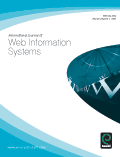
International Journal of Web Information Systems
Fostering collaboration in the world of information systems.The International Journal of Web Information Systems is a distinguished publication dedicated to advancing the field of web information systems, offering a platform for high-quality research and innovative practices. Published by EMERALD GROUP PUBLISHING LTD in the United Kingdom, this journal has established itself as a vital resource for researchers, practitioners, and academics from various disciplines, particularly in Computer Networks and Communications and Information Systems, as evidenced by its ranking in the 2023 quartile assessments (Q3) and Scopus rankings. With an H-index reflecting its impact within the academic community and a publication window spanning from 2005 to 2024, the journal is committed to fostering scholarly exchange and collaboration. While it currently does not have open access options, it provides valuable insights and breakthroughs that are essential for professionals and students navigating the ever-evolving digital landscape.

JOURNAL OF COMPUTER SCIENCE AND TECHNOLOGY
Empowering Research in the Digital AgeJOURNAL OF COMPUTER SCIENCE AND TECHNOLOGY, published by Springer Singapore Pte Ltd, is a pivotal platform in the rapidly evolving realms of computer science and technology. With an ISSN of 1000-9000 and an E-ISSN of 1860-4749, this journal encompasses a diverse array of topics including computational theory, hardware and architecture, software engineering, and applications of computer science. Spanning over three decades from 1986 to 2024, it boasts an impressive standing within academic circles, ranking in the Q2 quartile across several key categories and achieving notable placement in Scopus metrics. Although this journal operates under a subscription-based model, it remains a crucial resource for researchers, professionals, and students seeking to advance their knowledge and contribute to discussions in computer science. The JOURNAL OF COMPUTER SCIENCE AND TECHNOLOGY is committed to fostering innovation and scholarly communication in the field, encouraging submissions that contribute substantive advancements in theory and application.

Data Science and Engineering
Advancing the frontiers of data and technology.Data Science and Engineering is a premier open access journal published by SPRINGERNATURE, dedicated to advancing the fields of data science, artificial intelligence, computational mechanics, and information systems. Since its inception in 2016, this journal has rapidly established itself as a leader in the academic community, boasting an impressive Q1 ranking in multiple computer science categories, including Artificial Intelligence, Software, and Information Systems. With a commitment to disseminating high-quality research, it caters to a diverse audience of researchers, professionals, and students eager to explore the intersection of data and technology. The journal's robust global reach, combined with its respected reputation, empowers authors to share their findings widely, facilitating breakthroughs and innovations across the digital landscape. Join the vibrant community of scholars contributing to this integral field of study, and stay informed with the latest research by accessing the journal freely online.
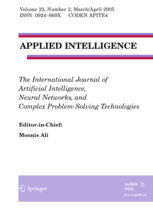
APPLIED INTELLIGENCE
Elevating knowledge in the realm of intelligent systems.Applied Intelligence is a prominent peer-reviewed journal that has been instrumental in advancing the field of Artificial Intelligence since its inception in 1991. Published by Springer, a reputable name in academic publishing, the journal focuses on the innovative applications of intelligent systems, algorithms, and methodologies across various disciplines. With an impressive Q2 ranking in the Artificial Intelligence category for 2023, and a Scopus rank of #117 out of 350 in its field, Applied Intelligence is recognized for its significant contributions and rigorous standards. The journal is accessed primarily through subscription, ensuring that high-quality research reaches the academic community and industry professionals alike. Its commitment to disseminating cutting-edge research makes it an invaluable resource for researchers, practitioners, and students interested in the practical implications of AI advancements. Join a community dedicated to exploring the transformative power of artificial intelligence and stay ahead in this ever-evolving field!